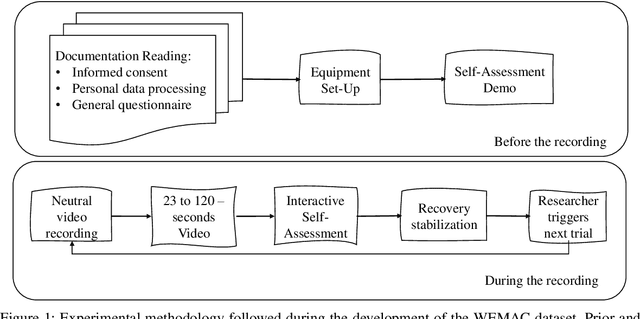Jose A. Miranda
Personalization on a Budget: Minimally-Labeled Continual Learning for Resource-Efficient Seizure Detection
Sep 17, 2025Abstract:Objective: Epilepsy, a prevalent neurological disease, demands careful diagnosis and continuous care. Seizure detection remains challenging, as current clinical practice relies on expert analysis of electroencephalography, which is a time-consuming process and requires specialized knowledge. Addressing this challenge, this paper explores automated epileptic seizure detection using deep learning, focusing on personalized continual learning models that adapt to each patient's unique electroencephalography signal features, which evolve over time. Methods: In this context, our approach addresses the challenge of integrating new data into existing models without catastrophic forgetting, a common issue in static deep learning models. We propose EpiSMART, a continual learning framework for seizure detection that uses a size-constrained replay buffer and an informed sample selection strategy to incrementally adapt to patient-specific electroencephalography signals. By selectively retaining high-entropy and seizure-predicted samples, our method preserves critical past information while maintaining high performance with minimal memory and computational requirements. Results: Validation on the CHB-MIT dataset, shows that EpiSMART achieves a 21% improvement in the F1 score over a trained baseline without updates in all other patients. On average, EpiSMART requires only 6.46 minutes of labeled data and 6.28 updates per day, making it suitable for real-time deployment in wearable systems. Conclusion:EpiSMART enables robust and personalized seizure detection under realistic and resource-constrained conditions by effectively integrating new data into existing models without degrading past knowledge. Significance: This framework advances automated seizure detection by providing a continual learning approach that supports patient-specific adaptation and practical deployment in wearable healthcare systems.
Personalised and Adjustable Interval Type-2 Fuzzy-Based PPG Quality Assessment for the Edge
Sep 23, 2023


Abstract:Most of today's wearable technology provides seamless cardiac activity monitoring. Specifically, the vast majority employ Photoplethysmography (PPG) sensors to acquire blood volume pulse information, which is further analysed to extract useful and physiologically related features. Nevertheless, PPG-based signal reliability presents different challenges that strongly affect such data processing. This is mainly related to the fact of PPG morphological wave distortion due to motion artefacts, which can lead to erroneous interpretation of the extracted cardiac-related features. On this basis, in this paper, we propose a novel personalised and adjustable Interval Type-2 Fuzzy Logic System (IT2FLS) for assessing the quality of PPG signals. The proposed system employs a personalised approach to adapt the IT2FLS parameters to the unique characteristics of each individual's PPG signals.Additionally, the system provides adjustable levels of personalisation, allowing healthcare providers to adjust the system to meet specific requirements for different applications. The proposed system obtained up to 93.72\% for average accuracy during validation. The presented system has the potential to enable ultra-low complexity and real-time PPG quality assessment, improving the accuracy and reliability of PPG-based health monitoring systems at the edge.
WEMAC: Women and Emotion Multi-modal Affective Computing dataset
Mar 01, 2022



Abstract:Among the seventeen Sustainable Development Goals (SDGs) proposed within the 2030 Agenda and adopted by all the United Nations member states, the Fifth SDG is a call for action to turn Gender Equality into a fundamental human right and an essential foundation for a better world. It includes the eradication of all types of violence against women. Within this context, the UC3M4Safety research team aims to develop Bindi. This is a cyber-physical system which includes embedded Artificial Intelligence algorithms, for user real-time monitoring towards the detection of affective states, with the ultimate goal of achieving the early detection of risk situations for women. On this basis, we make use of wearable affective computing including smart sensors, data encryption for secure and accurate collection of presumed crime evidence, as well as the remote connection to protecting agents. Towards the development of such system, the recordings of different laboratory and into-the-wild datasets are in process. These are contained within the UC3M4Safety Database. Thus, this paper presents and details the first release of WEMAC, a novel multi-modal dataset, which comprises a laboratory-based experiment for 47 women volunteers that were exposed to validated audio-visual stimuli to induce real emotions by using a virtual reality headset while physiological, speech signals and self-reports were acquired and collected. We believe this dataset will serve and assist research on multi-modal affective computing using physiological and speech information.
 Add to Chrome
Add to Chrome Add to Firefox
Add to Firefox Add to Edge
Add to Edge